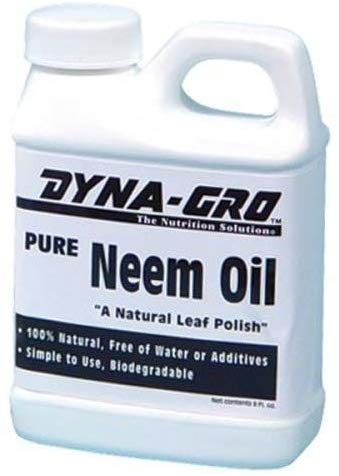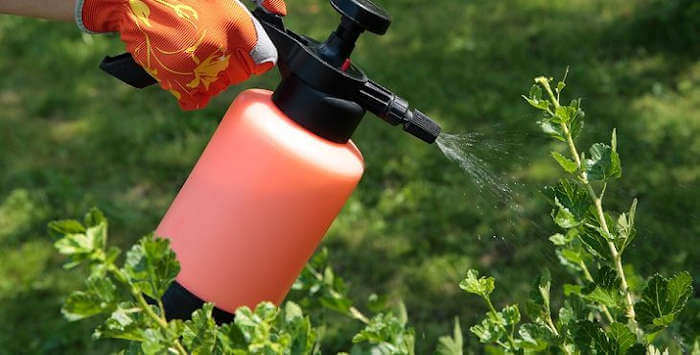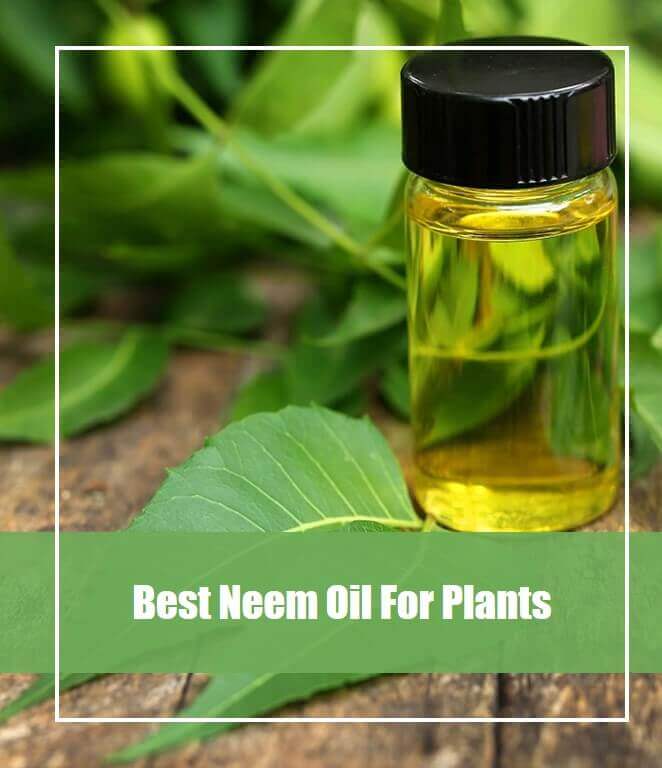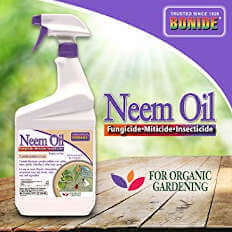Are you on your edge regarding the insect invasion, fungus, and mites infection your indoor or garden plants?
Fortunately, we’ve got a fix that’s 100% organic, harmless, and caution-free. It’s called the neem seed extraction oil or just ‘neem oil’.
We all know that there are tons of brands that produce neem oils and come up with a ‘whole-natural’ tag on them. But not all of them are good friends to your plants and yields.
Therefore, we’ve dug deep into the market and hand-picked 7 of the best neem oil for plants of yours. Take a few minutes to check the whole listing and pick yours.
In a hurry? Here is the overall best neem oil for your garden–
7 Best Neem Oil for Plants- Comparisons
| Products | Conc.Type | Volume | Price |
|---|---|---|---|
| Garden Safe HG-93179 Neem Oil | Concentrated | 16 oz | |
| Bonide (BND022) - Neem Oil | Ready to Use | 32 oz | |
| Natria 706240A Neem Oil | Conc. and RTS | 24 oz | |
| Safer Brand Neem Oil | Concentrated | 16 oz | |
| Southern Ag 08722 Neem Oil | Concentrated | 8.8 oz | |
| Organic Neem Bliss Neem Oil | Concentrated | 16 oz | |
| Dyna-Gro NEM-008 Neem Oil | Concentrated | 8 oz |
What Is Neem Oil?
Neem oil is neem seed extracts that are pressed out of the seeds with a method called ‘cold pressing’. It’s sourced from the plant with a botanical name called ‘Azadirachta Indica’, a broadleaf, evergreen tree that is mostly found in the Indian Regime.
Best Quality Neem oil for Plants-Reviews
1. Garden Safe HG-93179 Neem Oil Extract
Do you prefer gardening in an organic manner instead of stuffing plants up with cheap and low-end chemicals? If the answer is negative, you might be looking for something like Garden Safe HG-93179.
It’s a 3-in-1 neem oil. What that means is, you can apply it on your plants as one of these three- insecticide, fungicide, or miticide. In fact, neem oil by nature contains those virtues. Garden Safe HG-93179 just makes it better for you as a gardener.
Treating it as one of these three, you can fight a long list of diseases and insect invasions on your plants. The list of insects includes beetles, mealy bugs, worms, leafminers, and others. It can also beat fungus-related issues like powdery mildew, rust spot, needle rust, botrytis, tip blight, etc.
Apart from using it as one of those three, it can also be used as a dormant spray. In such a way, it can kill overwintering eggs of a number of insect types. Before that, we’d suggest you go through the complete usage guide and warnings that come with the product.
It comes as a 16oz bottle, which might seem a little less for mass-use. But if so, there is a 6-in-1 pack for you to grab.
Highlighted Features-
- OMRI-recognized neem oil for organic gardening.
- Acts as both insecticide and fungicide.
- Treats insects like bugs, beetles, flies, etc.
- Uproots fungal problems like spots, mildew, rust, etc.
- It can be used as a dormant spray as well.
2. Bonide (BND022) – Ready to Use Neem Oil
There are a number of concentrated neem oils available that work as multi-purpose fungus and insect killers. But if we narrow down our search into insecticide-only neem oils, there are just a few. And one of the top choices from them is the Bonide (BND022).
As we said, Bonide (BND022) targets insects and bugs only to treat on your garden. The hit list contains mites, mildew, flies, etc. Also, the earlier stages like eggs, larvae, etc are also at the laser target of this oil.
Although it claims to be a fungicide and miticide as well. But we didn’t find it as effective as an insecticide.
The last thing that we’d like to quote is its concentration. Usually, concentrated neem oils come in 16oz or 24oz bottles, with which you’ve to mix up water before neem oil insecticide application. On the other hand, Bonide (BND022) comes as a 32oz ready-to-spray solution that you can apply directly to the plants.
If you find diluting neem oil up as a hectic process, you might be way happier with the best neem oil spray like this Bonide Neem oil.
Highlighted Features-
- A powerful bug and insect killer.
- Treats both adult and earlier(larvae, egg) of insects.
- It comes as a 32oz, ready to spray solution.
- It makes great use as a dormant spray as well.
- It comes with a sprayer nozzle.
3. Natria 706240A Organic Neem Oil Concentrate
The next guest on the podium is 706240A Organic Neem Oil from Natria. It’s a 24oz neem oil that can be used as a Fungicide, Insecticide, and Miticide. As a Fungicide, it can treat Snow Mold, Dollar Spot, and Brown patch. And as a pesticide or Miticide, you can apply it on fruits, vegetables, spices, herbs, flowers, and so on.
Apart from the aforementioned, 706240A Organic Neem Oil is also able to treat Aphids, Spider Mites, Whiteflies, Black Spot, Powdery Mildew, and Rust on plants.
There are two versions of this neem oil in terms of concentration. By name, you might have seen that it’s concentrated neem oil, which needs to be diluted before application. And it contains 24oz of that. But in case you want a ready-to-go version of this oil, that’s also an available option.
However, if you want to go with the concentrated version, you have to prepare a solution of various concentrations for different uses. There is an in-depth guideline on that that you’ll receive once you have the product on hand.
Highlighted Features-
- 24oz concentrated or ready-to-spray neem oil.
- Works as pesticide, fungicide, and miticide.
- You can use it up to the day of harvesting.
- It can defeat heavily populated insect invasion.
- Treats black spots, mildew, aphids, whiteflies, beetles, etc.
- It needs to be applied once every 7 days.
4. Safer Brand Neem Oil Concentrate
If the earlier 24oz neem oil concentrate for plants seems to be a little more than what you need for your garden, we brought up the 16oz Neem oil from Safer Brand. Just like the earlier, it’s a concentrated neem oil which can make up to 16 gallons of spray once diluted.
Now, the question is what kind of diseases or shortcomings can be treated with this oil? At first glance, we found it to be effective against Black Spot, Aphids, Spider Mites, Botrytis, Blight, Turf diseases. Along with that, it is most effective against similar diseases to your plants.
Apart from diseases, it also kills overwintering eggs or insects that can be a potential threat to plant health. Especially insects like Aphids, Japanese beetles, Whiteflies, and Scale insects are at the laser target of this neem oil.
Based on the concentration of this oil, you can make up to 16 gallons of spray for your garden, and take care of the plant health till the harvesting. The only condition is, you have to use it either as a dormant or a delayed spray to let it work effectively.
Highlighted Features-
- Kills eggs, larvae, and adult insects.
- 16oz bottle that can be turned into a 16-gallon solution.
- Treats black spots, mildew, blight, etc.
- Works as an insecticide, fungicide, and miticide.
- Applicable to flowers, houseplants, vegetables, and fruits.
5. Southern Ag 08722 Triple Action Neem Oil
The next best neem oil for plants on our list is the Southern Ag 08722 Triple Action Neem Oil. The name might seem a bit clumsy. But let us explain the insider aspects of this oil, and you will get to come to a decision about whether it’s worth your time and money or not.
First thing first, it’s about the chemical quality. So far we are concerned, Southern Ag 08722 contains 70% clarified extract of natural, organic neem oil. That makes it capable of acting as a fungicide, insecticide, and miticide.
As a fungicide, this oil can treat black spot, powdery mildew, anthracnose, downy mildew, leaf spot, rust, etc. On the other hand, as an insecticide or miticide, you can apply this to treat spider mites, aphids, beetles, whiteflies, leafrollers, and so on.
It comes as a concentrated oil. So you might dilute it up before using it. Once one, you can use it on fruits, herbs, vegetables, and ornamental plants.
Highlighted Features-
- Consists of 70% concentrated neem oil.
- Works as an insecticide, fungicide, and miticide.
- Treats black spots, spider mites, aphids, and many more.
- 2 tablespoons of oil are needed for each gallon of mix.
6. Organic Neem Bliss 100% Pure Cold Pressed Neem Seed Oil
Many of the gardeners are afraid of the extra chemicals that come up with the commercially available oil extract. To deal with this problem, we’ve got a brand that produces 100% pure neem seed oil and brings that right at your doorstep. The name is Organic Neem Bliss 100% Pure Cold Pressed Neem Seed Oil.
Here go the detailed features of this best organic neem oil for plants–
The first impression that stands with this oil is it’s ‘One ingredient policy’. They use 100% pure neem seed oil, no extra chemicals or preservatives added. The oil comes in a cold-pressed state, which is a mechanical process to extract neem oil from neem seed.
What are the benefits? Well, this OMRI-certified neem seed extract is a pretty effective best neem oil for indoor plants and outdoor plants as well. In fact, you can use it for your body usage as well. But using it anywhere near the eyes is strictly prohibited. So, you better keep it limited within external use only.
Highlighted Features-
- Sourced from 100% pure Indian Neem plants.
- Chemically extracted through the cold-press method.
- OMRI-certified in terms of safety.
- Useful for both indoor and outdoor plants.
- It can also be used on human skin(external only).
7. Dyna-Gro NEM-008 Neem Oil

To finish up this list of neem oils for plants and herbs, we’ve got the smallest one in size on our hands. It’s called the Dyna-Gro NEM-008 Neem Oil and it comes in three variations of size. But for now, we’re going to proceed with the 8oz version.
Just like the previous product of this list, Dyna-Gro NEM-008 Neem Oil contains neem seed extract that’s sourced through cold-pressing. This method preserves the quality of organic neem seeds and preserves the durability as well. Therefore, it’s one of our best cold-pressed neem oils.
The sole purpose of using oil like Dyna-Gro NEM-008 Neem Oil is to keep the plant leaves clean and shiny. Now, why is that important? Well, apart from looking at the healthy, insect and fungus invasions are less likely to take place on clean, shiny leaves. And for a gardener, that makes quite a sense, right?
While doing so, don’t worry about clogging the stomata and prohibit plant respiration and photosynthesis. It doesn’t clog up the stomata, and we’re fine over there.
Highlighted Features-
- Extracted from neem seeds through cold-pressing.
- Shines up plant leaves and gives them a polished look.
- Don’t block or clog up your stomata.
- Keeps the plant healthy both internally and externally.
- Available in three different sizes.
How Neem Oil Kills Insects and Pests?
Throughout the review, you’ve seen it multiple times that the neem oil mixture for the plant is effective against insects. In all stages of them(egg, larvae, and adults), using a good quality neem oil might control insect invasion.
The question of the moment is, how does it do so?
Well, neem oil contains mainly neem seed extracts and Azadirachtin is the most active component of them all. Azadirachtin is a chemical that works great as an insect repellent.
On top of that, Azadirachtin can get into the insect’s hormonal system and makes it very difficult for the insects to grow and lay eggs on seasons. For some insect kinds like nematodes, this chemical also reduces the feeding and disrupting the growth.
As an overall action, insect invasion and existence fall down to an extent once neem oil(with azadirachtin) is applied to plants.
And good news:
Modern research has found some antifungal and antibacterial compounds(salannin, meliantriol, nimbin, and nimbidin) that kill and prevent fungus and bacteria. That’s why it is also popular as a fungicide among the organic gardeners.
How to Use Neem Oil on Plants?

The answer to the question lies within what kind of neem oil you’re using. If you’ve got ready to spray solution that comes with a nozzle, you can apply it directly on the plants where it’s affected with insects, fungus, rust, spots, etc.
On the other hand, if you’ve got a concentrated version of neem oil, the unsafe might vary.
Here go the steps of using concentrated neem oils on your plants-
Step 1: Mix it Up
Follow up the instruction on how much oil(usually 1 or 2 tablespoons) you have to mix with 1 gallon of water. Mix the solution thoroughly.
Step 2: Put it into a sprayer
Ready to apply neem oils come with a container sprayer. In case you’ve bought a concentrated version, it might not contain any sprayer nozzle.
Therefore, get a bottle and replace the bottle head with a sprayer nozzle. And put the neem oil solution into the bottle.
Step 3: Apply Gently on the affected spots
Now you are ready to apply the neem oil solution on the plants. Before that, identify the exact spots where you are supposed to do that.
Usually, when you treat this solution as insecticide, fungicide, and miticide, the places of application are different. Sometimes, it’s the leaves, sometimes, it’s the plant roots, and sometimes, it’s the whole plant.
Therefore, mark the spots carefully(take expert consultancy if needed) and apply the mix into the right spot.
Step 4: Maintain the schedule
Once you are done with applying the neem oil on the plants, it’s just the starting of a scheduled application. Based on the plant, neem oil solution concentration and types of threats, the schedule might vary.
Usually, it’s a ‘Once in a 7 days’ or ‘Once in a 14-days’ period as long as usual neem oil solutions are concentrated. But based on the improvement level or loss of symptoms, this cycle can vary and even diminish after a certain period.
According to the expert,
To apply neem oil as preventive insecticide or fungicide- It should be applied once in a 7-14 days interval.
And to apply as curative insecticide or fungicide- Apply once in a 7 days interval. In severe conditions reduce the interval period (4-5 days).
Best Time To Apply Neem Oil on Plants?
The early morning and early evening is the best time to treat your plants. Neem oil will get enough time to work before the sunrise and sunset if you apply neem oil in the early morning or early evening.
DIY: How to Mix Neem Oil for Plants at Home
You can use household neem oil to make homemade neem oil spray. Here is some recipe to make homemade neem oil-based insecticide spray for the garden pests and fungus.-
Recipe 1: Homemade Neem oil for Insects (.5% conc.)
- Mix 1 teaspoon of neem oil per liter of water.
- Add 1-2 ml of liquid castile soap or insecticidal liquid soap.
- Shake the solution and spray it on the plants.
Recipe 2: Homemade Neem oil for Fungal Diseases (1% conc.)
- Mix 2 teaspoon of neem oil per liter of water.
- Add 1 teaspoon of liquid castile soap or insecticidal soap.
- Shake the solution and spray it on the plants.
Recipe 3: Neem oil for Soil Drench
- Mix 1 teaspoon neem oil per liter of warm water.
- Apply the neem oil solution to the soil.
Recipe 4: Neem Oil and Baking Soda Fungicide for Plants
- Add 2 tablespoons of baking soda. 1 tablespoon of castile soap and 2 tablespoons of neem oil into 1 gallon.
- Mix the solution and apply the plants to prevent fungal diseases as well as insects.
Remember:
Generally, .5-1% solution is perfect for garden insects. If you need a more concentrated solution, add more neem oil. But remember! high concentrated solution can harm your plant. Must do some tests before applying thoroughly.
Neem Oil Benefits for Plants
If you’ve made to this point of the review, you might have got enough idea on how beneficial neem oil is for plants. But for the record, we’re nothing them down again-
- You can control insects of all physical stages of growth.
- It controls invasions of a lot of insect types(almost 200 species) Example- Aphids, Mites, Leafhoppers, White Flies, Caterpillars, Thrips, etc.
- When it comes to controlling nematodes in a potted environment, Neem oil is one of the best.
- It targets harmful insects and nematodes only. Beneficial earthworms stay untouched.
- Neem oil is organic and biodegradable. So, no harm to the environment.
- It’s harmless to pets, cattle, and wildlife as well.
- No death zone is created on the usage of neem oils. But the other chemical products create a death zone. if any beneficial insects(bees, butterflies, etc) come in the zone, they died.
- It can be sprayed on the plant in the growing season or in the dormant season. Plants don’t appear any negative signs.
- Neem oil also best for the lawn. It can control and prevent Japanese beetles and lawn grubs.
- Neem oil cake used as organic manure and pesticide.
- Neem oil can control and prevent most of the fungal and bacterial diseases of plants such as powdery mildew, rust, leaf spots, blight, and so on. That’s why It is mostly used as a fungicide and bactericide.
- Neem oil doesn’t contain any harmful substances. That’s why it is most popular among indoor and greenhouse lovers.
- Neem oil works on all type of plants (i.e: vegetable, ornamental plants, fruits, flowers.trees, and herbs)
- It can available in various forms. Wettable powders, Granule, Dust, Emulsifiable concentrate are the types of neem oil available in the market today.
- It is easy to use on the plants and can be applied until the day of harvest.
Neem Oil Safety
As long as side effects and cautions are concerned, there are a few of them regarding neem oil. But what does cause harm to your plants is over-concentrated neem oil solutions.
Therefore, the only neem oil safety that you should be concerned about is to prepare the solution with utter care and not overdo it. That’s it!
FAQs
#Is Neem Oil a Fungicide or Insecticide?
Neem oil contains azadirachtin that acts as an antifeedant and growth inhibitor. That’s why neem oil can prevent insect larvae from mating and interrupt the egg-laying. So, it can be undoubtedly said, neem oil is a good organic insecticide.
But wait- there’s more;
Neem oil contains some antifungal and antibacterial substance(salannin, meliantriol, nimbin, and nimbidin) that makes it a good fungicide as well as a miticide.
#Is Neem Oil a Systemic Insecticide?
Some gardeners claim that neem oil is a systemic insecticide. What does that mean? That means plants absorb the neem oil and disturbed to the plant tissue. When the insect will try to feed the plant sap, the neem oil inter the insect body and kill them.
Sad but true, it is not proved by any research yet. Neem oil is a contact insecticide that can kill the insect when the insect feed and touch the neem oil.
That is the reason neem oil can’t be effective too much as a soil drench. But it can kill soil-borne insect larvae if they come in contact.
#Is Neem Oil Safe for Plants?
Yes! It is a non-toxic, biodegradable solution for your plants. It is safe for vegetables, fruits, indoor, outdoor plants, and lawns.
But remember this:
Shouldn’t apply high concentred neem oil on the plants. It can damage your plant. The best idea to spray a small area of plants and wait for 2 hours. If you don’t see any damage or burn sign. Apply entire plants.
#What is the Best Neem oil for Treating Plants?
The specially formulated neem oil for the plant by cold pressing that has no toxic or chemical substances. You can also apply generally neem oil on the plants for treating. But you need to prepare a dilute solution before spraying.
Here is the recommended readily available neem oil for garden-
#Is Neem Oil Safe for Human and Pets?
Neem is a completely safe product for humans and pets. But sometimes it may cause eye and skin irritation and also irritating to the stomach if you swallow it.
And you might be happy:
USDA(United States Department of Agriculture) marked it as safe for humans, pets, and beneficial insects.
#Where to Buy Neem Oil Pesticide?
You may buy neem oil pesticide from any local garden shop, pesticide store, or online store(Amazon,eBay, Home Depot). But must read the label and review before picking the neem oil for your plants.
#Can I Mix Neem Oil with Copper Fungicide?
Yes! It can be okay to mix neem oil with copper fungicide. But you must consider the concentration. Test before spraying on the entire plant. If the plant shows any burn sign, dilute the solution by adding more water.
#What Bug Does Neem Oil Kill?
Neem oil can kill almost 200 plus insects. Here is a list of some affected insects-
whitefly, aphids, thrips, hoppers, Japanese beetles, moth larvae, scale, spider mites, lawn grubs, slugs, harmful nematodes, worms, codling moths, adelgid, sawflies, lace bugs, chinch bugs, crickets, earwigs, flea beetles, squash bugs, stink bugs, caterpillars, mealybugs, ants, mosquitoes and so on.
#What Disease Does Neem Oil Kill?
Neem oil can prevent and cure most of the common and destructive fungal and bacterial diseases of plants such as powdery mildew, black spot, scab, anthracnose, rust, leaf spot, gray mold(botrytis), root rot, tip blight, fire blight, verticillium wilt, etc.
#Can You Spray Neem Oil on Fruit?
Neem oil is completely a natural product and it doesn’t contain any harmful things. So, you can spray it on your fruits without any hesitation. The good news; you can spray neem oil on fruits until the day of harvest.
Conclusion
Alright, so we’ve reached the dead bottom of this discussion. Check out the listing over again to find the right amount, concentration, and price. Hopefully, it’ll be a one-stop solution to most of your plant health issues, once and for good!









